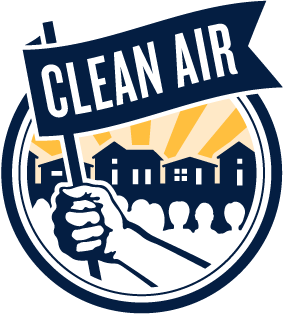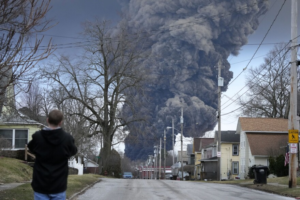The Norfolk Southern Derailment in East Palestine is BAD, but not for the reasons you may be thinking
Clean Air received several inquiries this week from WNY residents concerned about possible air quality issues locally related to the Norfolk Southern Derailment in East Palestine, OH. This worry is understandable – the images of a looming black cloud are shocking, and the information floating around has been confusing and contradictory.
We’re also far more aware now with the growth in western wildfires, worsened by climate change, that smoke can carry very far, making our summers here in WNY hazy.
We want to be clear – the risk of any health and environmental impacts on us here in WNY, over 150 miles away from the East Palestine derailment, is not zero, but is statistically so low that it may as well be.
The danger from this derailment is to the community of East Palestine and to folks who live in the surrounding area.
Official statements during the initial fire called for an evacuation of a one mile radius, and the Pennsylvania Department of Environmental Protection called for residents within two miles to shelter in place. Dead fish and a sheen on the water was reported five miles away, and a lawsuit filed by residents is for up to 30 miles surrounding.
For a local comparison, let’s remember the Bethlehem Steel fire in 2016 – the smoke from that fire was visible for miles, with some officials concerned about the smoke as far south as Orchard Park. NYS DEC detected contaminants in the air in Lackawanna for several days after the fire was put out. Coverage of the fire was featured in national news outlets, like the New York Times. It was an environmental disaster for Lackawanna, Buffalo, and the surrounding suburbs, and, for those who live or lived nearby, still is.
That said, it was unlikely you were concerned at all about environmental contamination from this fire if you lived in Syracuse or even Rochester – the distance was far enough to reduce any risk to you.
There are, however, several direct impacts related to this incident that we hope our members and supporters will come away with, and be ready to take action on.
- We should all support rail unions and rail workers in their calls for more time off, more staffing, and better working conditions.
- Rail unions and workers have been sounding the alarm about the increasing dangers from understaffing, insufficient time off, and worsening infrastructure for several years now. Understaffing and overworking was at the core of a possible rail strike just a few months ago.
- Just a few months ago several tanker cars derailed in the Lovejoy/Broadway Fillmore neighborhood, and in 2020 a derailment in East Aurora forced evacuations of 41 homes – corporate greed is putting us all at risk!
- Our air quality has been poor recently, but this is due to our existing local pollution sources and current weather patterns, which are far more of a risk to the health and well being of WNY residents.
- Erie and Niagara County have close to three dozen Title V facilities, many located within our membership neighborhoods. These permits allow these facilities to emit a restricted amount of air pollution into our communities – worse, as our members who live with the health impacts from Tonawanda Coke can attest, other businesses are run by irresponsible managers who do not even follow the restrictions of their permits, and our regulators are so understaffed and under resourced that they cannot always act.
- Our continued reliance on fossil fuels for the heating and fueling of our cars and homes adds to local air pollution, and in certain weather conditions, like cold winter days with dry air, that pollution becomes trapped at the ground level.
- Join us on March 16 at our General Meeting to learn more about Air Quality – click here to register.
- We need better communication in crisis situations and during the subsequent clean-up.
- Ultimately all communities deserve community advocates participating in communications and being fully briefed, like with the Tonawanda Coke and American Axle Working Groups. Municipal officials everywhere should engage community groups in their communications about community concerns.
- When the Tonawanda Coke smokestacks were demolished, area residents were concerned about possible contamination from the dust. Clean Air helped analyze what the risks were and were not, and then shared that information as well as precautions residents could take.
- Disinformation can run rampant during crisis events, especially when public officials are absent in the initial communications, or worse, corporate entities who benefit from downplaying risks are allowed to lead on messaging.
- Given the current state of the media and how the far right weaponizes people’s fears, we need our public officials to be better advocates for the community and to be out front in sharing information with the public.
- Part of household disaster planning should include plans for chemical spills and industrial contamination.
- Industrial contamination from accidents will continue to remain a fact of our lives so long as we continue to rely on a fossil fuel based economy. We should all take time to plan for industrial accidents in our neighborhoods. What would you need to do to shelter in place? Do you have the means to seal off a room? And, if it comes to it, do you have plans for what to do if an evacuation is called for?
- Check out Ready.gov for more resources, and join Clean Air for our next mutual aid disaster prep trainings.
- No more sacrifice zones.
- Ultimately, freight rail needs to be part of our transition to a renewable economy, but we need to decarbonize to phase down and eliminate our demand for dangerous fossil fuels and petrochemicals that are currently being carried on rail, and we need a Just Transition that prioritizes both our communities as well as workers in the planning and implementation.
In the following few weeks, we will post a couple more blog entries on the East Palestine derailment and how we can all take action in support. In the meantime, we encourage our members to support these mutual aid requests and to sign this petition being shared by affected communities.
RSS 2.0 feed. Both comments and pings are currently closed.

